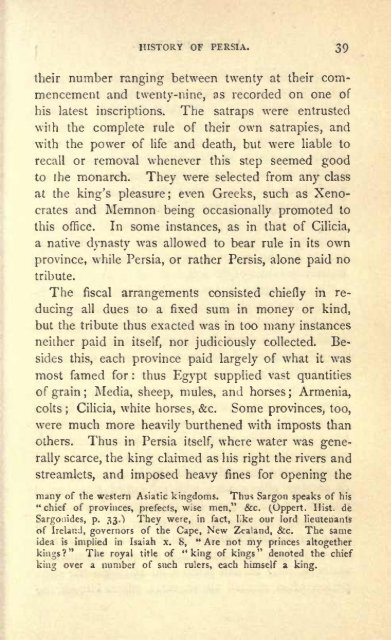Persia from the Earliest Period to the Arab
Persia from the Earliest Period to the Arab
Persia from the Earliest Period to the Arab
You also want an ePaper? Increase the reach of your titles
YUMPU automatically turns print PDFs into web optimized ePapers that Google loves.
HISTORY OF PERSIA. 39<br />
<strong>the</strong>ir number ranging between twenty at <strong>the</strong>ir commencement<br />
and twenty-nine, as recorded on one of<br />
his latest inscriptions. The satraps were entrusted<br />
with <strong>the</strong> complete rule of <strong>the</strong>ir own satrapies, and<br />
with <strong>the</strong> power of life and death, but were liable <strong>to</strong><br />
recall or removal whenever this step seemed good<br />
<strong>to</strong> <strong>the</strong> monarch. They were selected <strong>from</strong> any class<br />
at <strong>the</strong> king's pleasure; even Greeks, such as Xeno-<br />
crates and Memnon being occasionally promoted <strong>to</strong><br />
this office. In some instances, as in that of Cilicia,<br />
a native dynasty was allowed <strong>to</strong> bear rule in its own<br />
province, while <strong>Persia</strong>, or ra<strong>the</strong>r Persis, alone paid no<br />
tribute.<br />
The fiscal arrangements consisted chiefly in re-<br />
ducing all dues <strong>to</strong> a fixed sum in money or kind,<br />
but <strong>the</strong> tribute thus exacted was in <strong>to</strong>o many instances<br />
nei<strong>the</strong>r paid in itself, nor judiciously collected. Be-<br />
sides this, each province paid largely of what it was<br />
most famed for : thus Egypt supplied vast quantities<br />
of grain; Media, sheep, mules, and horses; Armenia,<br />
colts ; Cilicia, white horses, &c. Some provinces, <strong>to</strong>o,<br />
were much more heavily bur<strong>the</strong>ned with imposts than<br />
o<strong>the</strong>rs. Thus in <strong>Persia</strong> itself, where water was generally<br />
scarce, <strong>the</strong> king claimed as his right <strong>the</strong> rivers and<br />
streamlets, and imposed heavy fines for opening <strong>the</strong><br />
many of <strong>the</strong> western Asiatic kingdoms. Thus Sargon speaks of his<br />
"chief of provinces, prefects, wise men," &c. (Oppert. Hist, de<br />
Sargonides, p. 33. ) They were, in fact, like our lord lieutenants<br />
of Ireland, governors of <strong>the</strong> Cape, New Zealand, &c. The same<br />
idea<br />
"<br />
is implied in Isaiah x. 8, Are not my princes al<strong>to</strong>ge<strong>the</strong>r<br />
kings?" The royal title of "king of kings" denoted <strong>the</strong> chief<br />
king over a number of such rulers, each himself a king.

















